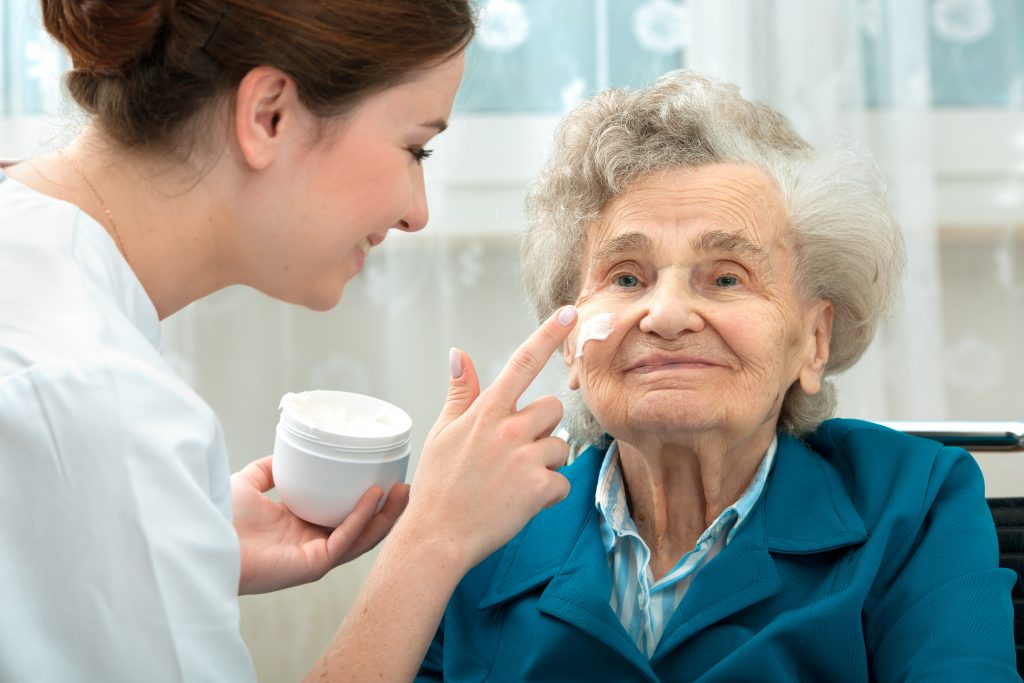As your loved one is growing older, they may need some assistance when it comes to their own cleanliness. Senior hygiene responsibilities become more than just mindless everyday tasks and require much more effort. They may not want to ask for help, but remember that they just might need you. Talking about senior hygiene can be a difficult conversation for your loved one, so remember these tips when it’s time to have the talk.

Proper senior hygiene is critical to health.
5 Tips for Talking About Senior Hygiene
1. Consider the causes
Before you have the conversation, think about what may be causing your loved one’s hygiene to decline. Here are some common reasons for poor hygiene.
Memory Loss
If your senior is showing signs or is diagnosed with Alzheimer’s or Dementia, they might have some trouble remembering their routine. Maybe they don’t even realize that they aren’t keeping up with their cleanliness, so be sure to be sensitive to this when you talk with them.
Depression
As we age, depression becomes more common. Whether the reason is loneliness, changes in the brain, or a major life event, it could be affecting your loved one’s bathing habits. The person can be well aware that their hygiene is not well maintained, but depression can cause them to be careless. Seeing a doctor can help with this concern, and may lead to a renewed interest in hygiene.
Physical Limitations
Developing physical impairments can play a crucial role in maintaining hygiene. Joint diseases, age-related changes, and other causes can contribute to poor cleanliness, since they may not be able to move in all the ways that they used to. Signs of this could be difficulty removing container lids, limited reach, and restricted movement.
2. Be respectful, but honest
While having this conversation can make you feel like a parent, don’t treat the elderly like they are children. You can start by asking if there is a reason for their lack of hygiene habits. If they know the reasons talking about senior hygiene can be easier and more productive. Stay calm while talking with them, and let them know what you are noticing. Also take cues from their body language and reactions so you can respond in the best way.
Keep in mind that your loved one might be embarrassed when you bring up their grooming behaviors. Try to be understanding and make them feel comfortable. Let them know that you only want to help and that you are willing to make compromises.
3. Ask about them
Instead of you just talking and having them listen, ask how they are feeling. As stated above, they might be embarrassed. Talking about senior hygiene can go much smoother if both parties can understand where the other is coming from. Some elderly can be stubborn and reluctant to share feelings, but try to keep an open conversation. If you know more about your loved one’s situation, you will be able to provide better help. It can take more than one conversation to get on the same page; so don’t give up after the first try.
4. Create a plan
While you are talking about senior hygiene, come up with some solutions as a team that will benefit your loved one. Writing out a routine or checklist can be very helpful to remind them of what needs to be done. If they seem to need a little more help, consider investing in products designed for seniors to make grooming easier. This way, they will still feel a sense of independence in taking care of themselves.
5. Keep communicating
Talking about senior hygiene should not stop after the first conversation. It can definitely be the hardest, but it will get easier as you are both more open to the subject. With physical and mental changes always happening, it is important to keep up with your loved one’s situation and make sure cleanliness is a priority. Keep watching for signs of change and address them as soon as possible.






September 9, 2017
Great Post!